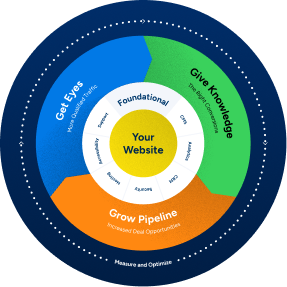Your organization’s website is perhaps your most valuable business asset, and overtime it must evolve and adapt to modern business trends in order to effectively drive sales and improve bottom line profitability. In order to best accomplish this, your marketing team or vendor must work to keep your website’s search engine optimization (SEO) as inline with current trends as possible. This is so that Google and other search engines can serve up your website when potential customers input a search query relevant to your organization.
Ready for a backlink cleanup?
Search engine optimization standards are some of the most complex and complicated standards to maintain. One SEO element that your organization must keep track of and actively manage is your backlink portfolio. Your backlinks refer to inbound hyperlinks from external websites. It is both a business critical and extremely difficult process to manage, and requires at times for you to actively work to have them removed. In this article we’re going to talk about what backlinks are, and how allowing the wrong kinds of backlinks can actually hurt your website’s SEO performance and keep Google and other search engines from directing traffic back to your site altogether.
Sources of Bad Backlinks
Search engines are designed to provide searchers with relevant and helpful content. Complex algorithms are used to determine relevance of websites relative to user input and subsequently those algorithms only return sites found to meet those basic criteria after scanning various on-page SEO elements. A major contributor to relevance is a page’s authority and reputation for providing high-quality content. Absent a numerical ranking system, search engines weigh a page’s authority in part by how often other websites covering similar subjects and content link back to that page as a reference. Essentially an endorsement or referral, backlinks are not all created equally. While some sources bolster your relevance, other backlinks can actually harm your credibility if left in place.
Press Releases
Google and search engines prefer backlinks to come from evergreen material that is relevant for longer than a new product’s ramp-up timeline. Because press releases aren’t truly informative articles and receive wide distribution and duplication across multiple domains, backlinks from them hold little weight.
Backlinks from Obviously Contrived Attempts to Artificially Create Relevance With Quantity Over Quality
When it comes to Google and the major search engines, you do not want to get caught trying to game the system. There are several methods used by users trying to actively manipulate their website’s relevance via backlinking activities. This can include:
- Using Private Blog Networks to Create Dedicated Backlink Sources – This is an inbound marketing trick used in bad faith to create a collection of “high authority” websites all linking back to another site you owned, which you’ve monetized. This manipulative approach is highly penalized by search engines.
- Spamming blog comment sections – Many organizations will deploy bots to locate and comment on unmoderated blog comment sections with backlinks included in the spammy content. Such backlinks don’t originate from informative articles and again, hold little weight.
- Unjustified presence on foreign language websites – If your business is based in America, and you don’t do business overseas, then your business should rarely, if at all, be linked on foreign websites. Inbound backlinks at volume from Russian or German language sites gives the same impression as utilizing private blog networks and other strategies considered manipulative bthe
- “Cheap Link” Services – You can’t realistically buy your way into more search results by posting on linking services. Only hard work and building legitimate linking arrangements with like-minded businesses will result in effective, organic backlinks.
- Backlinking from Blatant Self Promotion – Offering to write a slew of guest blogs and ensuring that you backlink to your own site will signal to Google and other search engines as an obvious attempt to self-promote.
When Legitimate Backlinks Get Hijacked
In the examples above, website owners are trying to manipulate and game the search engines. However, there is an instance where backlinking takes place without your knowledge but can still damage your search engine rankings. This occurs when your site is backlinked from websites that spin or duplicate the legitimate content of others, and in the process create duplicate backlinks. This instance is a little trickier because these sites are taking existing content and either outright duplicating it, or changing it just enough to spin it into a new article. Left uncorrected, this can damage legitimate links you’ve worked to build on other sites because both of these will be seen by Google or a search engine as duplicated content on the web. Search engines prefer fresh approaches to original content, and will punish anything that appears to be linked from multiple identical articles. Out of all of the types of bad backlinks, these are the most likely to occur without your having a hand in the process and can be damaging your site’s performance without your knowledge.
Identify and Remove Bad Backlinks to Improve Your Search Engine Performance
You can’t leave bad backlinks unaddressed, as overtime they will be working in the background to delegitimize all of the hard work you’ve put into your website content and all of the legitimate backlinks you have negotiated with other relevant businesses. Therefore, it’s critical that you’re always verifying your brand’s backlink status and taking action as necessary.
Finding Bad Backlinks
Ironically, it’s Google that can also provide you with a powerful tool to check on your backlinking status in the form of the Google Backlinks Checker. If you need more robust scans, there are a number of free and paid tools you can use to scan for your URL across the web, and the scan will tell you whether a link is hurting your search performance or helping it overall. Scheduling this process as a regular “backlink audit” will help keep your business healthy and ahead of any negative impact.
Be Proactive About Controlling Your Backlinks
There’s no way for you to actively remove bad backlinks from sites owned by other businesses or individuals. You might have to do some digging to track down the owner of the target sites in order to then turn around and send them a request asking them to please remove the offending link, explaining to them the impact it is having on your own website’s search engine performance. In instances that you cannot get a webmaster to comply with your request to remove, and not just “no-follow” harmful links, you can use a combination of Google’s Disavow tool and URL removal tool to effectively mitigate and minimize the impact they have on your site.
GoingClear Provides Online Marketing Support You Can Trust
Based in Boston, GoingClear is a digital marketing agency that understands how to properly establish online marketing best practices for your organization’s website. We understand modern SEO requirements and we’ve got the tools and expertise to help control your organization’s search engine performance. To learn more about our search engine optimization services, reach out to our team today. Our team of marketing professionals can tackle any challenge you throw at us.

